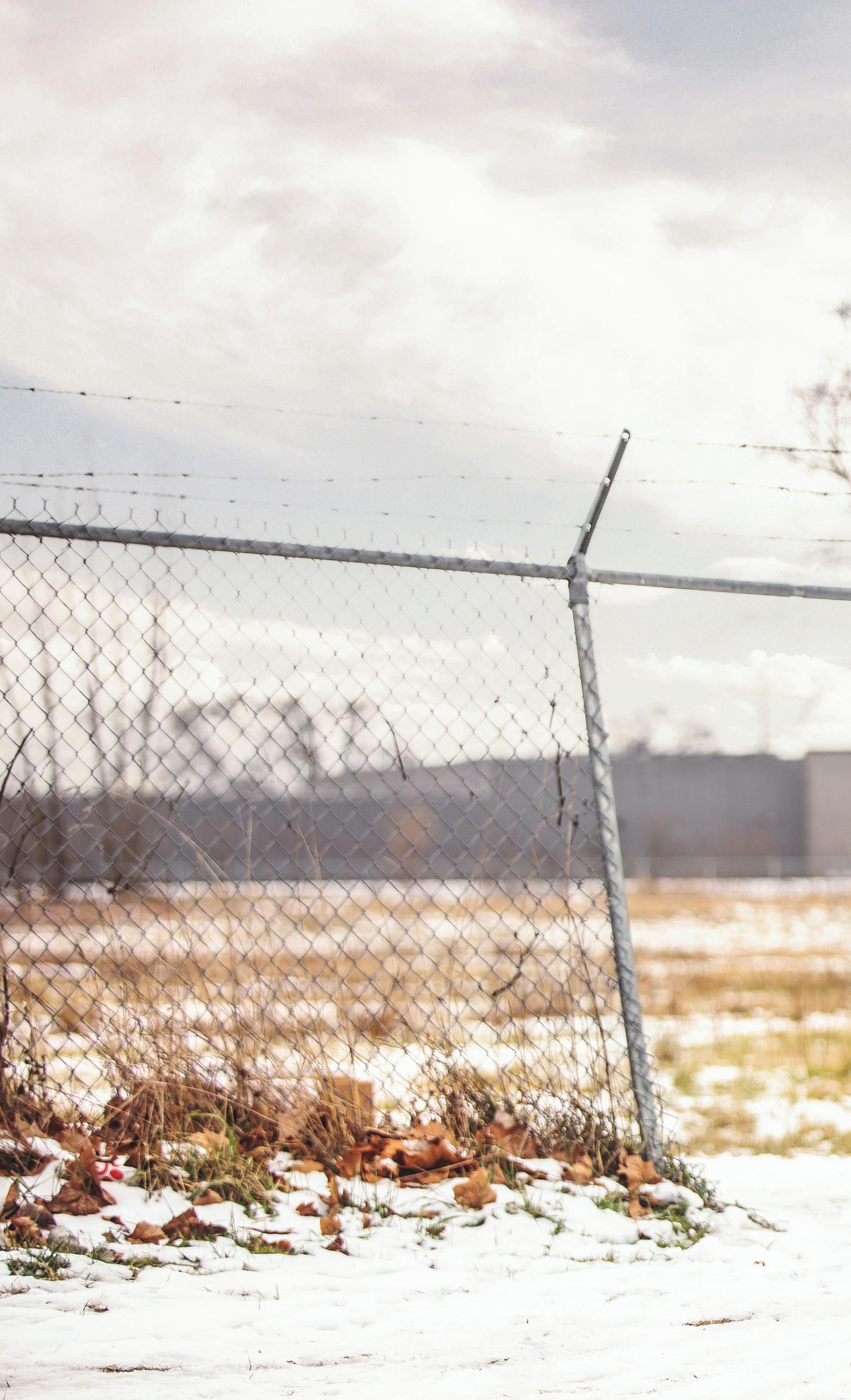
12 minute read
FEATURE
Creating Change
History is at the heart of Michelle Johnson’s work toward inclusion, equality and social justice
by MARIE LEE and CHRIS KILLIAN
Apublic scholar and intellectual. A social justice advocate. A disc jockey. An author and screenwriter. These are just some of the roles Dr. Michelle S. Johnson has taken on.
“I’m doing a lot,” the 58-year-old says.
There’s an understatement.
Johnson is a whirling dervish of determined energy, diverse in her focus and passionate in her endeavors, always with an eye toward unveiling inequality, promoting justice and healing, and ushering in new paradigms of inclusion, equality and social justice.
“I am just carrying on the work that’s been going on for years,” Johnson says modestly. “I just love creating a stage and supporting folks who have energy to create and to create change.”
Learning from the past
Johnson is perhaps first and foremost a historian. It is what informs everything she does.
As a child, born in Kalamazoo and raised in Saginaw, she would tape conversations with others on a Panasonic tape recorder, not knowing then that she was dabbling in her first oral history project. “I was always interested in history. I have always been interested in how people live and how it impacts their lives,” she says, “but I didn’t know it could be a career.”
It wasn’t until she attended Michigan State University and learned about a degree in humanities that Johnson knew what she wanted to do. At the time she was studying pre-law, focusing on minority-majority group relations. “In that process it became very clear that many of the things I experienced in Kalamazoo and in Saginaw were resonant with these larger questions of class, race, and gender and space, place and history,” says Johnson.
Brian Powers
Michelle Johnson stands on the brownfield on Kalamazoo’s east side that she and her Institute for Public Scholarship are aiming to rehabilitate and turn into a park for health and wellness.
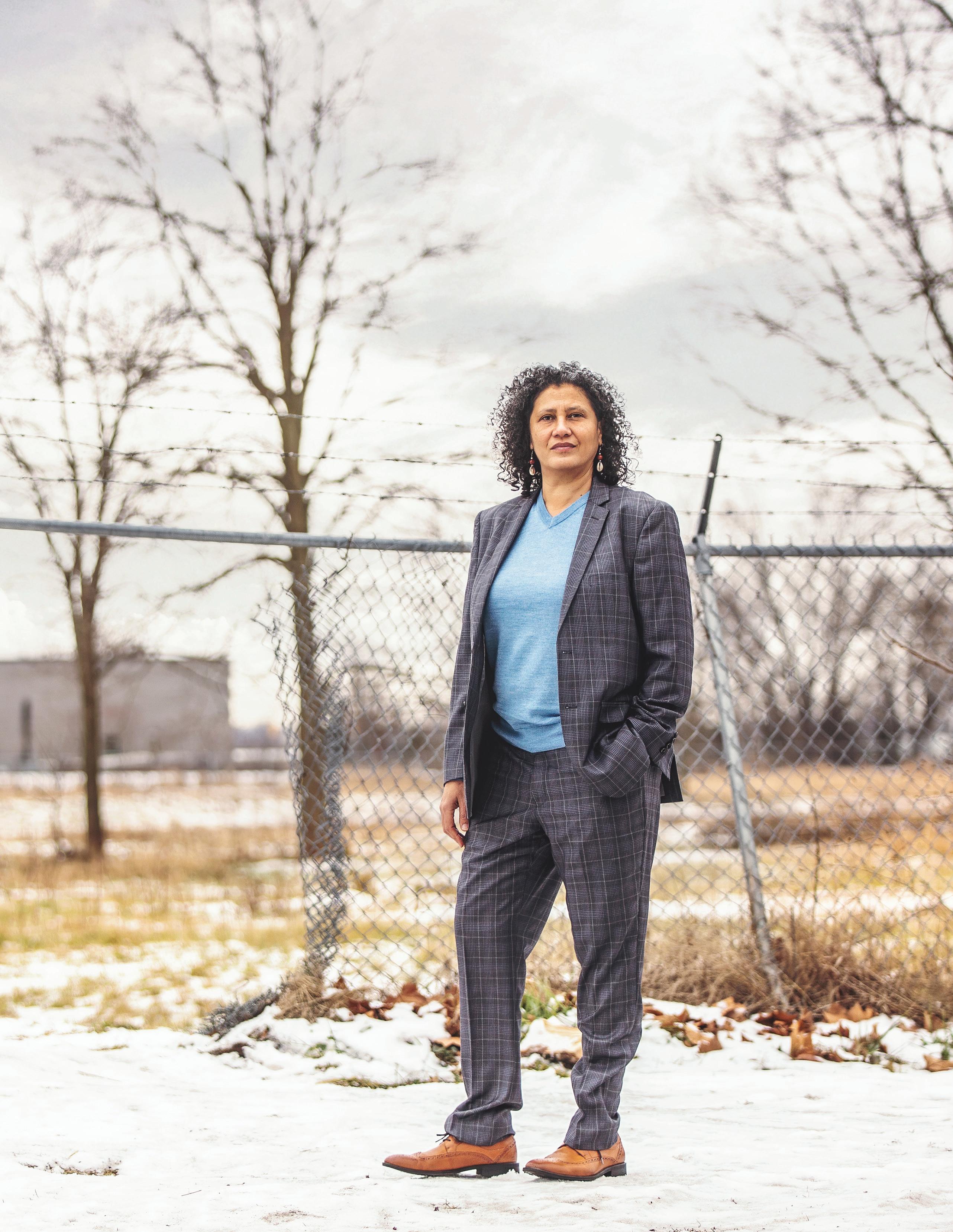
“I found that it expanded the lens for me to understand my personal experience and my family's experience and make sense of what I had gone through and seen as a child. You know, I integrated my elementary school at 4 years old in Saginaw in the ’60s, and even though I had a great family, a 4-year-old is not equipped for people's rabid racism. My education was very much a process of making sense of where I had come from and where my family had come from.”
Johnson earned a bachelor’s degree in humanities with an emphasis on English, philosophy, psychology and women's studies. She went on to earn a Ph.D. in American culture from the University of Michigan, where her work focused on African American and 19th-century literature, environmental history and African American author, anthropologist and playwright Zora Neale Hurston. And while her academic interests may seem disparate, all have found a place in her work today.
After getting her doctorate, Johnson became an assistant professor of English at the University of Wisconsin-Milwaukee, and during her second year there she was given a Rockefeller Humanities Fellowship at the University of Florida. “I went down there and followed behind Zora Neale Hurston, went to the places she’d collected folklore and went to the places in Loughman (Florida) where she collected some of the work for her book Mules and Men and her anthropological work on the South. That’s where I really realized, ‘Oh, I want to be a public scholar.’”
Public scholarship is a fusion of research, education and creative activity that engages the public, with the intention of creating positive change within a community. If the field sounds a bit academic and obtuse, Johnson’s track record in it is illuminating.
The Rockefeller fellowship led her to create a two-year project in Loughman of researching and staging the first-ever performance of Hurston’s play Polk County, which is set in that community.
From 2000 to 2008, Johnson was Michigan’s Freedom Trail coordinator, facilitating educational curricula for elementary and middle school students and the implementation of historical exhibits and planning related to the Underground Railroad and resistance to slavery in Michigan.
In 2014, she became a state historian, leading a statewide effort to document life in Black communities in Michigan from 1815 to 1915 and to develop exhibits. At the same time, she led several oral history projects across the Great Lakes State, including projects that explored the Civil Rights movement in Kalamazoo and the experiences of Blacks and Latinx in Saginaw and Detroit and Black residents of Kalamazoo.
“The past is cool, so long as we are learning the lessons from history,” she says. “It’s easy to say we imagine that something is needed, that some kind of change needs to take place, but we need to create that change, and we need the space to be able to make it happen.”
Johnson moved to Kalamazoo in 2004 and co-founded the Fire Historical and Cultural Arts Collaborative with local poet and educator Denise Miller in a renovated historic fire station building on Portage Road, in the Edison neighborhood. Fire began as a place to showcase art, poetry and music, provide a space for youth development and welcome the LGBTQ community, and help people of all ages find their authentic voice. Over time it has become a youth-driven arts and justice program that provides a safe space for youth to express, heal and connect with themselves and others through creativity.
Johnson describes Fire as “an extension of my 25-year insistence on space for marginalized people to express their autonomous and authentic selves.” She stepped away from Fire four years ago, which was a difficult decision, she says, but one that freed her to pursue other projects.
Boosting community
One of those other projects is solidly in the realm of public scholarship. Johnson, along with a team of established public scholars, has established the Institute of Public Scholarship, in which the academic areas of the humanities, arts and sciences intersect and which “takes our knowledge out of the academic walls and applies it in the larger

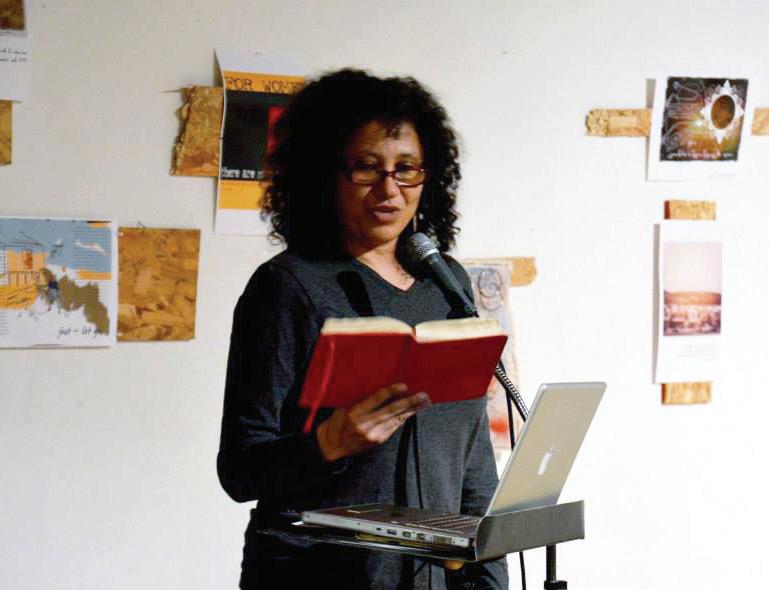
Above, top to bottom: Johnson as a young child and giving a poetry reading at Fire Historical and Cultural Arts Collaborative, which she helped cofound in a renovated fire station on Portage Road. Right: As DJ Disobedience, Johnson has worked as a disc jockey on WIDR and for events.
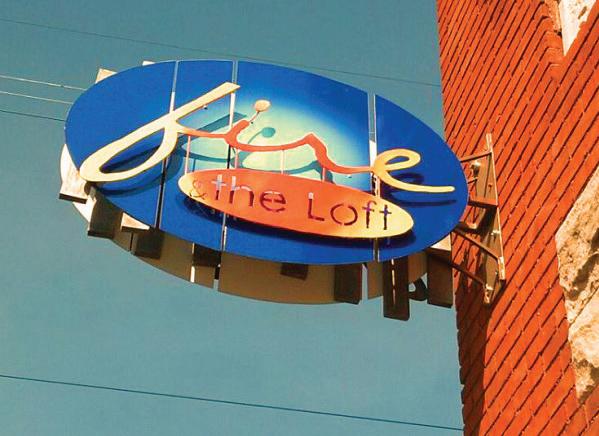
world to imagine and integrate strategies for development that benefit the whole community,” Johnson says.
Her efforts have been recognized with a three-year grant from the Stryker Johnston Foundation.
“It’s a longstanding dream, something that I have been wanting to do for at least 20 years, that really identifies (that) the solutions that we see to many of our societal issues are at the intersection of the sciences, arts and humanities,” she says. “We are drawing from
Courtesy

“The past is cool, so long as we are learning the lessons from history. It’s easy to say we imagine that something is needed, that some kind of change needs to take place, but we need to create that change, and we need the space to be able to make it happen.” - Michelle Johnson
the experiences and work of Black scholars that I've worked with over the decades to identify ways that we can address a variety of issues and then partnering with allied White scholars and other scholars to give community initiatives further capacity to be able to do the work that they're intending to do.”
Reclaiming land for wellness
An example of this work is a project Johnson calls the Riverview Wellness Park, to be created on 7.5 acres on Kalamazoo’s east side, along the Kalamazoo River. The project will create accessible intergenerational play spaces and exercise opportunities, based on transformative principles of play, for populations of play-deprived teens and adults, she says.
“Play is a basic animal need, not just a human need, particularly for people of color, women, poor folks and other marginalized groups,” she says.
Johnson says the park will not only promote health and wellness, but also promote the paradigm of inclusive land use in an area predominantly composed of people of color. The project moves away from the idea that unused land must be privately developed, she says.
“How do we create spaces that are accessible to everyone, especially those who have been oppressed?” Johnson asks.
The plot of land for the project is problematic, however. It is located in a floodplain and is a site where coal ash from coal-burning power plants was dumped for years, leaching toxins such as lead into the soil. "One of the first areas of focus to make this wellness park accessible is to find ways to remediate the land and the toxins that are there as well as embrace the idea that it will flood. It has flooded, and it will probably flood again,” Johnson says. “We are thinking through and researching the historic use of the land to identify vital remediation processes that we can utilize to extract some of the toxins out of the land.
“It's quite interesting. There were trees there that were pulling out some of those toxins, but at the same time there were people who didn't have other homes that were there living in areas under the trees, kind of camping out on that land. There's a long history of that. The city's response at that time was to get rid of the homeless problem by getting rid of the trees, so they cut the trees, which didn't end the homeless situation by any stretch of the imagination.
“One of the focuses for the Institute of Public Scholarship is to make sure that the folks who are currently living on that land are at the table informing us about their experiences living on that land. We know that people are potentially having some reactions to the coal ash that is there. That’s the importance of oral testimony and of the sciences and the humanities in building an assessment of and forward movement for the land.
“We are very much focused on — I don’t mean to appropriate it — but the Native American concept of the seven generations. We know, particularly in that land, that many of the issues that we're dealing with are at least 200 years old, many of the solutions are probably 200 years old in many ways too, and we have to think through anything that we do as being sustainable and thriving 200 years out from this moment.”
Telling forgotten stories
The idea that the past informs us is at the heart of another Institute of Public Scholarship effort: partnering with the Kalamazoo Historical and Cultural Landscape Project through Truth, Racial Healing & Transformation Kalamazoo, or TRHT. The project, sponsored by the Kalamazoo Community Foundation, will feature permanent markers and installations throughout the city to tell the stories of familiar and lesser-known moments of Kalamazoo history that highlight Black, Latinx and Match-E-Be-Nash-She-Wish Potawatomi people.
As a recognition of the importance of her work in this area, Johnson was named a 2021 Rubinger Fellow by the national Local Initiatives Support Corp. and will use the $40,000 award to establish a Cultural Land Trust to elevate the history and protect the infrastructure of Black and Brown communities.
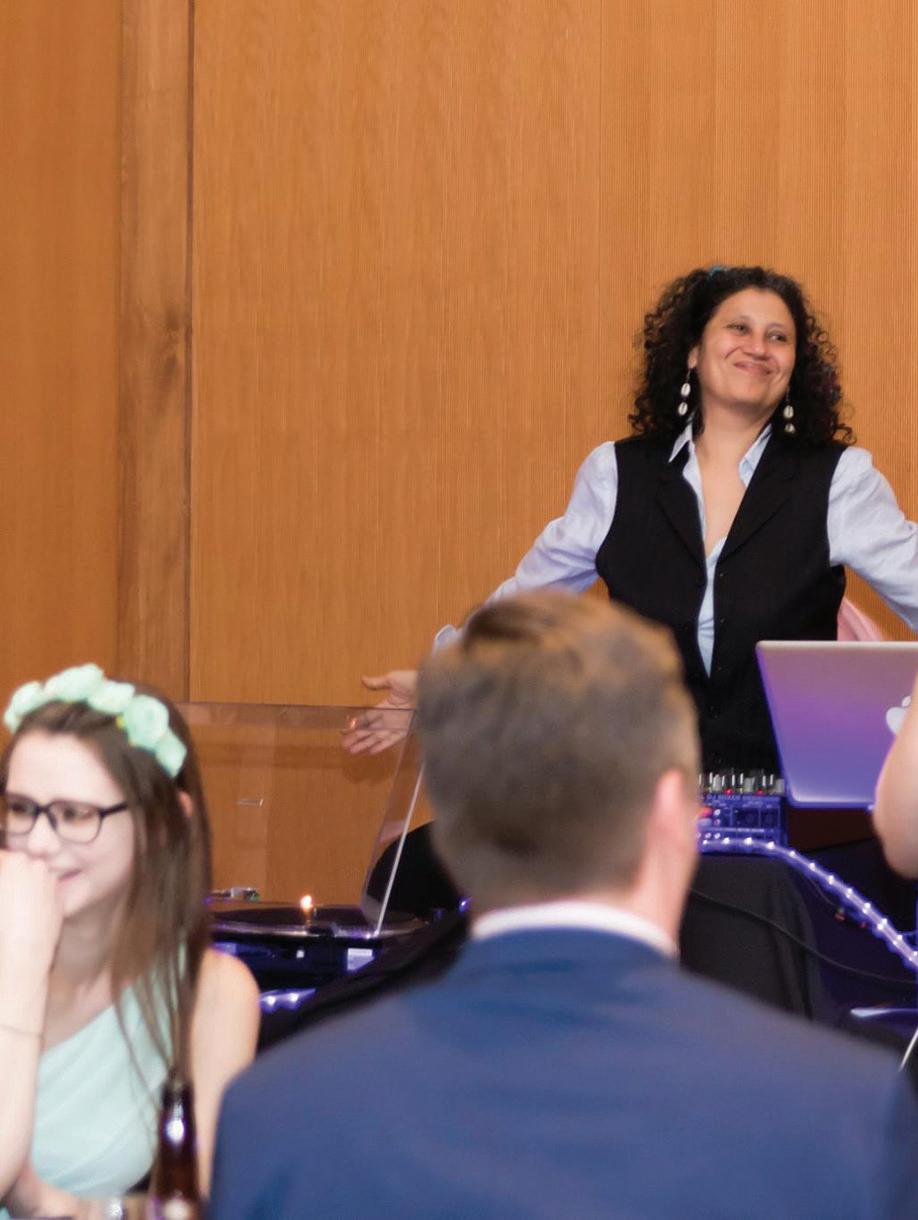
As an Independent Agency, Trust Shield Insurance Group strives to offer the most comprehensive coverages with a competitive price. We are not here just to sell you insurance but to be a partner in protection for all of your personal & business insurance needs. Business Coverage • Commercial Property • General Liability • Business Automobile • Commercial Umbrella Personal Coverage • Homeowners • Automobile • Umbrella Liability • Life Insurance • Annuities
452 N. Grand Schoolcraft (269)679-4918
301 N. Richardson St. Vicksburg (269)649-1914 trustshieldinsurance.com


It’s a way, Johnson says, of not only bringing important and difficult issues to light, but discussing the past as a way of building a bridge to a future that heals the wounds of systemic oppression.
“I feel like we are in an incredible time in history,” Johnson says. “There is a growing and powerful critical movement of Black folks seeking to do something. The level of conscious activism is rising. Kalamazoo, for all its challenges, responds to group action. There is a focus here on social justice, and we have a crucial mass of people here who understand racism and the inherent injustices in many of our institutions.”
In a city that is seeing significant growth, especially in the downtown area, the institute is also seeking to provide a pathway for sustainable and equitable community development, a pushback of sorts to the inequity of gentrification that Johnson says is already at hand in the residential real estate explosion downtown.
“We are shooting off on our own path,” she says. “We need to integrate notions of just development in our city planning in order to stop the social erasure of people of color and poor folks in so many development projects. The idea is to do something different, to engage the community in discussions of privilege.
Courtesy

Johnson, as DJ Disobedience, spins music at an event.
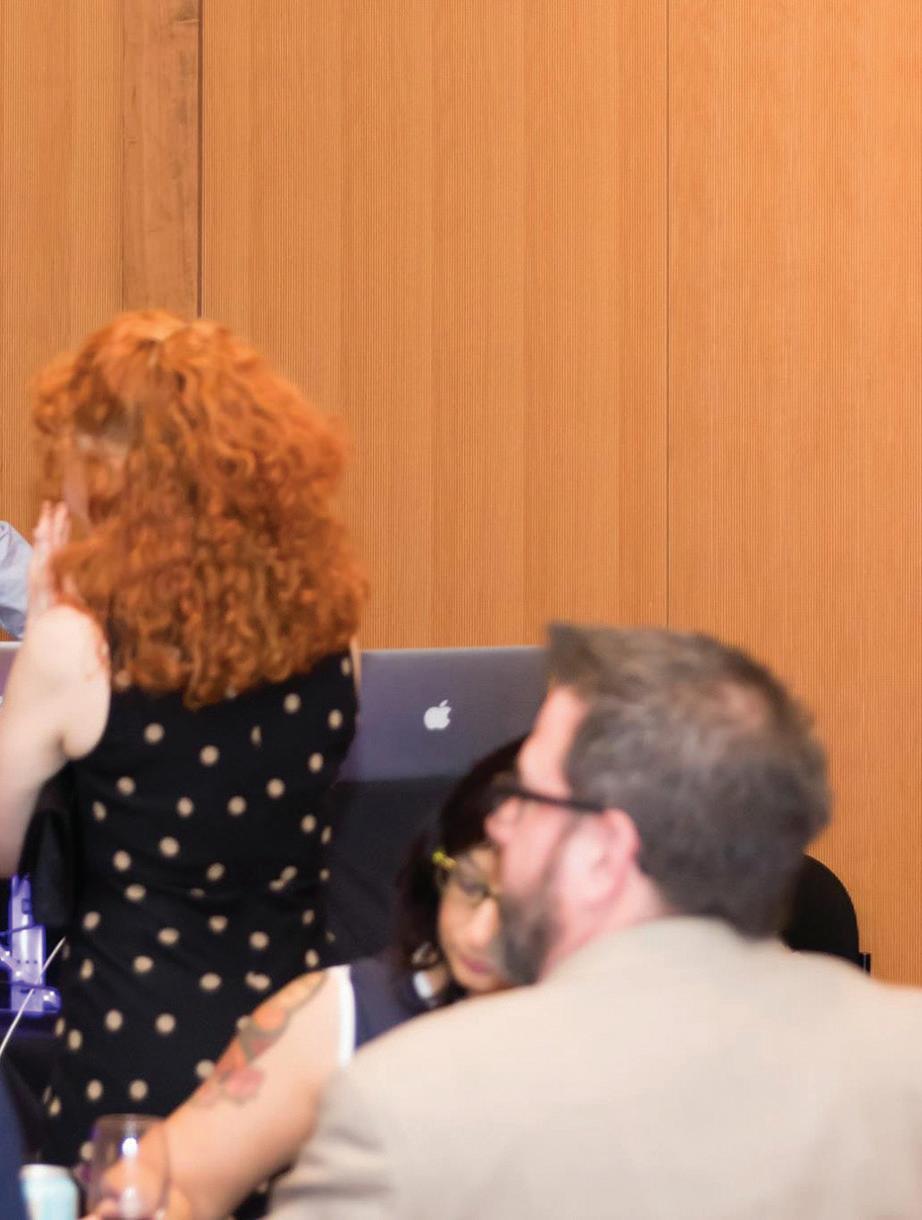
“I have spent lots of time on resistance. Now I am expanding that to insistence. I am expecting a better way of life for those who have historically been oppressed. I am claiming that space because my voice is important.”
Wait, there’s more
And just when you think you’ve heard about everything that Johnson is doing, you find out you’re wrong. Hopelessly wrong. Because she also has a prolific creative side as an author, screenwriter, producer and disc jockey.
Remember that Panasonic tape recorder from her youth? “It was really important for me as a kid to connect with the radio and listen to music,” she says. “One of my favorite things to do was a made-up radio station that my best friend and I had. We called it WBOJ, and we made recordings of our radio station playing music that we recorded off the radio. We did interviews. We did the news. I’ve been in love with the idea of radio my entire life.”
Michelle’s biological father, Roy S. Merricks, was a musician who played with a Kalamazoo band called King Oliver and His Men. Johnson’s family lived on one side of a duplex, King Oliver and his wife on the
Become a member today!
Benje Daneman - Individual Member Co-Director/Co-Founder, Jazz & Creative Institute

By helping artists through funding, providing performance opportunities, and supporting/advising artists of all areas and levels, the Arts Council allows our flourishing artist community to be even stronger, better and more creative.
Learn how we can support you too! KalamazooArts.org/membership
Four out of four ducks agree...
Forensic Fluids Laboratories are the Oral Fluid Drug Testing Specialists.








